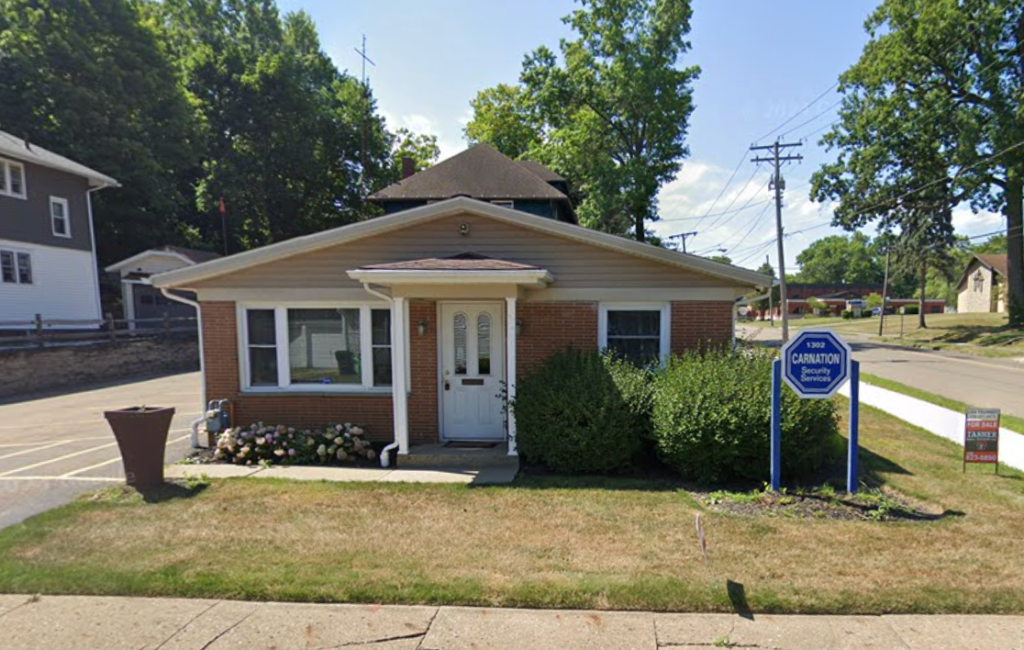ALLIANCE ‒ Alliance Area Domestic Violence Shelter is expanding its visibility with an outreach center, officials say.
The center will be in a separate location − formerly Carnation Security Services, Inc., at 1302 S. Arch St. − from its confidential shelter. It is expected to open by early summer, one a renovation is completed.
The nonprofit agency also will move its offices to the center, creating space for two additional rooms at the 90-day shelter. The shelter, which is always at capacity, currently has seven units for survivors of domestic abuse.
Board President Michelle Collins-Sibley said visitors to the current offices must sign confidentiality agreements saying they will not close its location. The new center will have a visible presence with signage.
The former Carnation Security Services, Inc., building at 1302 S. Arch St. in Alliance will become the new outreach center for the Alliance Area Domestic Violence Shelter.
“A disclosed location will enhance our profile in Alliance and the broader community significantly, especially with respect to educational outreach,” Collins-Sibley said. “It will also enhance our ability to write and obtain grants previously unavailable to us.”
Executive Director Ashley Huprich said individuals or families who need the free services, including counseling, will be able to visit the center − not the shelter − in the future. It also would be the place for donations.
“The new building is within walking distance of The Commons, (Rodman Public) library and the downtown area,” Huprich added.
Ashley Huprich: ‘Everybody at some point will know someone affected by domestic violence.’
Huprich, 40, was hired in October to lead the shelter after six years with the Domestic Violence Project, Inc., in Canton. She replaced Kristina Drummer, who took another job but still promotes the shelter.

Ashley Huprich, a 2003 Dover High School graduate, has been executive director of the Alliance Area Domestic Violence Shelter since October 2024.
“My formal background is education, but I knew that I didn’t want to be a traditional teacher,” Huprich said. “I really felt a call to do what I could to help with the cycle of violence. I have a passion to help survivors.”
She was a prevention educator and grant writer for the Domestic Violence Project, Inc., serving as development and community relations director for almost five years before she left for Alliance.
“Everybody at some point will know someone affected by domestic violence. It doesn’t discriminate,” Huprich said.
Study: Domestic abuse, or intimate partner violence, is common in Ohio
Huprich said a 2024 study, “The Economic Impact of Intimate Partner Violence in Ohio,” commissioned by the Ohio Domestic Violence Network, showed domestic abuse is widespread in the Buckeye state.
The total annual number of victims in Ohio is estimated at 188,575 and the estimated economic loss associated with domestic abuse, or intimate partner violence, is $1.2 billion.
The study said about 38% of Ohio women and 33% of Ohio men experience, “intimate partner physical violence, intimate partner rape, and/or intimate partner stalking” at least once in their lifetime.
Economic Impact of Intimate Partner Violence in Ohio by Benjamin Duer on Scribd
It also stated this type of violence is “more common in Ohio relative to the U.S. as a whole,” and officials with the Alliance Area Domestic Violence Shelter said it is a problem in Stark County, as well.
“The need is out there, especially in a post-COVID world,” said board member and survivor Jess Patz, a Stark County native. “The aggressiveness and severity of it has increased. We’re trying to meet the demand.”
The shelter looks to diversify funding due to federal uncertainty
The Alliance shelter meets its local demand with a litany of services and programs, including emergency shelter, support, case management, support groups, financial classes and education. All of the services are free.
It relies mainly on grants from federal and state governments, and private foundations. It also has fundraising events, and receives donations.
“We have benefited and continue to benefit from state funded grants − our local representatives have worked to continue to support us,” Collins-Sibley said. “We do have concerns about the changing landscape for federal funding.”
Huprich described it as “scary times.”
For example, Collins-Sibley said a grant from the federal Violence Against Women Act has been a reliable funding source for the shelter. The “changing priorities in the current administration,” she said has made it clear that, “we need to diversify our funding sources.”
What might that look like? Patz said the shelter would get creative with current funds to stretch them, and it will need to “increase our local footprint” to attract more local donations from individuals and foundations.
“The community really supports nonprofits in this area,” Huprich said.
The officials said the uncertainty will push a long-term dream of either a larger shelter or a second shelter down the road.
“Our priority for now and continuing on the future is keeping the shelter doors open 24 hours a day, 7 days a week, 52 weeks a year,” Collins-Sibley said. “That means paying utilities, providing groceries, diapers, toilet paper − everything a household needs.
“We’re also working hard to pay our staff (of 12) a living wage and provide health benefits along with continuing education for staff, volunteers and board members, not to mention the costs of technology, maintaining a hotline, providing transportation vouchers, the list goes on. While we are fortunate that we own our buildings, the cost of living continues to rise.”
Reach Benjamin Duer at 330-580-8567 or ben.duer@cantonrep.com. On X (formerly Twitter): @bduerREP.
This article originally appeared on The Repository: Ashley Huprich leads Alliance domestic violence shelter
Read the full article here


